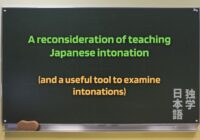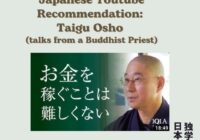Category Archives: General
A reconsideration of teaching Japanese intonation (and a useful tool to examine intonations)
Japanese intonation, in a nutshell, consists of a series of high and low pitches, where each word has a characteristic pattern of these high and low pitches. There are words where the pitch rises, words where the pitch falls, as well as where the pitch both rises and falls. When a word is said in… Read More »
Japanese Youtube Recommendation: Taigu Osho (talks from a Buddhist Priest)
As part of my continuing education in Japanese I’m always on the lookout for good content in Japanese that is interesting, educational, or both. While watching videos is fun, in terms of budgeting my time I find I have many more opportunities to experience content going on a walk or driving, so I tend to… Read More »
Anime movie review: One Piece Film Z
While I had watched a few episodes of the One Piece anime many years ago, for whatever reason I stopped watching it. Then when the Netflix live-action series came out a few months ago I watched it immediately and was really impressed––it seemed like one of the best anime to live-action adaptations to date. The… Read More »






